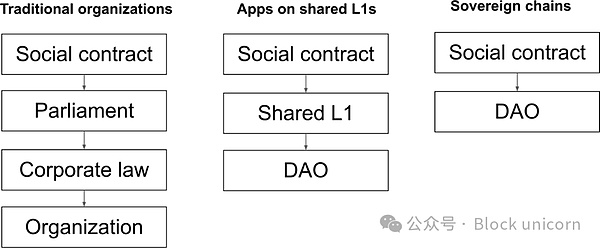Author: musalbas Translator: Block unicorn
"Everyone has the right to freedom of peaceful assembly and association. No one can be forced to join an association." - Article 20 of the Universal Declaration of Human Rights
Communities have the inalienable right to flourish through self-organization and collective action, without being constrained by the status quo. The technology that can launch community-owned computer programs, in the form of sovereign blockchains, is essential to realizing this right.
Throughout human history, the development of society has been driven by groups with common goals, whether through grassroots movements, struggles, innovations, or cultural pursuits.
In order to fully realize the rights to freedom of assembly and association, people must be able to create and execute shared social agreements and contracts that record group relationships in the community. They must be able to enforce these agreements without relying on middlemen such as states or corporations, which traditionally tend to be slow, bureaucratic, untrustworthy, corrupt, or susceptible to censorship.
For the first time in history, blockchains allow consenting people to enter into shared economic and contractual relationships with each other without relying on untrusted middlemen to enforce the terms of those relationships. This has enabled many new social and economic archetypes to emerge, including Decentralized Autonomous Organizations (DAOs), Distributed Cooperative Organizations (DisCOs), Decentralized Finance (DeFi), Collaborative Finance (CoFi), and Regenerative Finance (ReFi).
Sovereign blockchain is a sovereign community
"Governments of the industrial world, you tired giants of flesh and steel, I come from cyberspace, the new home of the soul. On behalf of the future, I ask you, the past, to leave us. You are not welcome in our gathering place. You have no sovereignty here." - "Declaration of Independence of Cyberspace"
Blockchains are community-owned computer programs whose rules are jointly enforced by everyone who has a copy of the same computer program and participates in the network as a node.
This network does not require any higher authority to enforce the rules of the community-owned computer program, such as the military or the police. The rules are directly enforced by the participants of the network, and the ledgers generated by the network have meaning and value because the community has given them these characteristics through social contracts.
Therefore, blockchains are sovereign because they directly implement the will of the community bound by a shared social contract. This in turn gives the community sovereignty, similar to the sovereignty of a country.
Top-level social contracts
All rules and laws governing contractual relationships ultimately derive their authority from the social contract.

Traditional organizations, for example, derive their authority from the laws of the country in which the organization is registered, which may derive from the country's legislative body, such as parliament, and ultimately derive their authority from the social contract between the people, which may be recorded in the constitution. Through social consensus, these social contracts can and often do amend the laws under them, either peacefully or by force.
These social contracts are top-level social contracts because they serve as the foundation from which all contracts under them derive their authority, and there is no authority above them.
Blockchains uniquely have their own top-level social contract independent of the state’s top-level social contract, enforced by social consensus of the sovereign community that participates in the network and gives meaning and value to the ledger. Likewise, this social consensus can amend the rules of the blockchain through hard forks, which only makes sense if the blockchain network community is sovereign through its own top-level social contract.
Sovereign Rollup Chains as Sovereign Communities
Similar to traditional contracts, non-sovereign smart contracts can be created under a sovereign blockchain that operates as a smart contract platform. For example, a DAO deployed on a layer blockchain would be in this case. However, this DAO would not be a sovereign community because its authority is not derived from its own top-level social contract, but from the contracts of third parties. If the DAO’s community wishes to achieve justice in some way and needs to enforce its social contract, it will not be able to do so without the permission of its upper layer top-level social contract.
The ability of sovereign communities to create their own top-level social contracts is a fundamentally unique and powerful new archetype enabled by blockchains. However, sovereign communities creating their own first-level blockchains need to deploy and maintain their own first-level consensus and validator networks, which introduces significant overhead.
By avoiding the need for each sovereign community to deploy a new consensus network, sovereign rollup chains significantly reduce the friction for sovereign communities to implement their top-level social contracts in the form of community-owned computers. This will usher in a new reality where communities do have the inalienable right to thrive through self-organization and collective action, unfettered by the status quo.
By making deploying a sovereign chain as easy as deploying a blog, the era of millions of sovereign communities with their own top-level social contracts rapidly emerging in the form of sovereign chains may be around the corner.
Build modularly, stay sovereign.
 Alex
Alex







